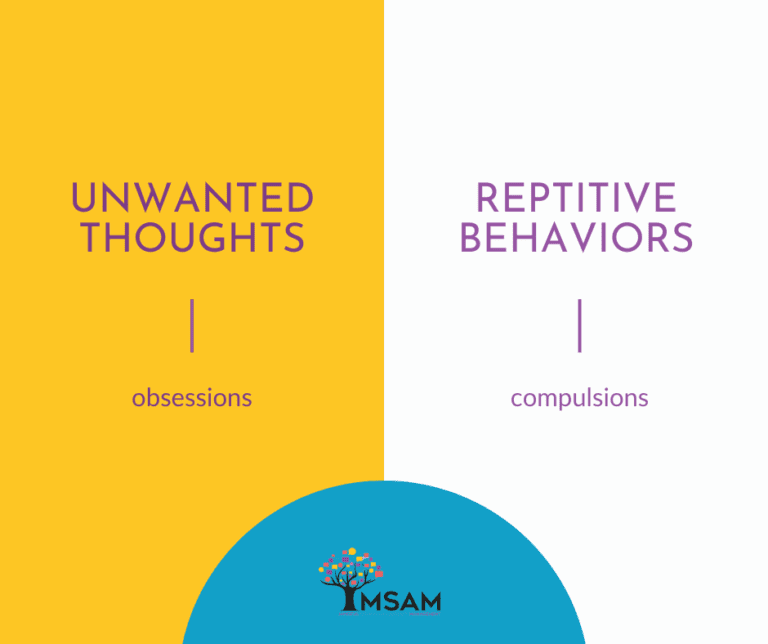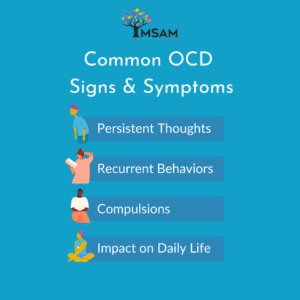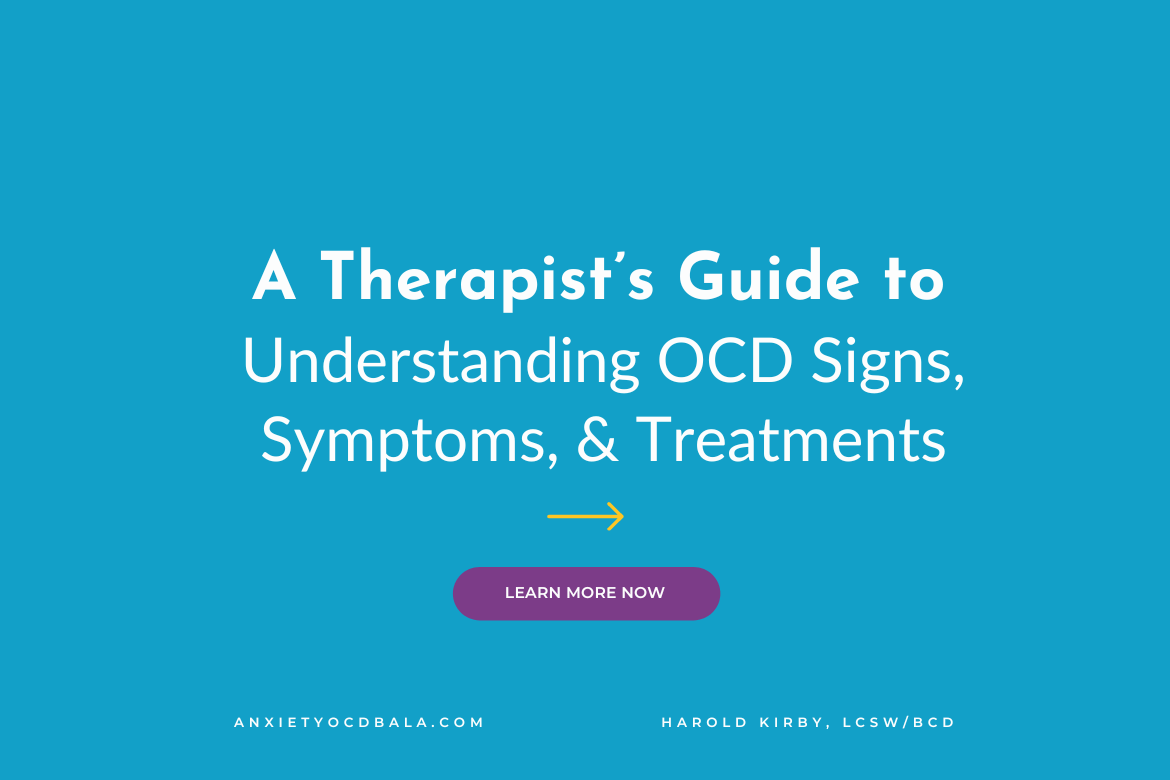What is OCD?
Obsessive-Compulsive Disorder (OCD) is a complex—and often debilitating—mental health condition characterized by recurrent, unwanted thoughts (obsessions) and repetitive behaviors (compulsions). These obsessions and compulsions can significantly interfere with an individual’s daily activities and quality of life.
Need to read the basics first? Start here.

Understanding the unique characteristics of OCD, having an accurate diagnosis, and finding a qualified specialist is crucial in achieving recovery. As a licensed cognitive behavioral therapist (CBT) and OCD specialist with over thirty years of clinical experience, I work daily with OCD sufferers in South Carolina, New Jersey, and Pennsylvania.
I know OCD profoundly impacts individuals and their families. So, I’ve compiled this guide to help you understand the most common OCD types and treatment options available.
Let’s delve into the nuances of OCD types and explore effective treatment options.
Understanding the Common Types of OCD
The impact of OCD goes beyond the individual, affecting family relationships, work performance, and social interactions. Educating oneself and others about the symptoms and reality of living with OCD is a critical step towards breaking the stigma associated with mental health disorders and encouraging those affected to pursue treatment.
Determining that it is OCD is the first step. OCD types manifest in various forms, each with distinct obsessions and compulsions. Recognizing the OCD type is crucial for tailoring effective exposure OCD treatment.
Common OCD types (categories) include:
- Contamination
- Harm
- Symmetry and Ordering
- Hoarding
- Relationship
- Purely Obsessional
- Perfectionism
- Existential
- Sensorimotor
- Sexual Orientation
- Health Anxiety
- Scrupulosity
More About Common OCD Types
Contamination OCD
Typified by fears of germs, dirt, or getting sick, individuals may engage in excessive cleaning, hand-washing, or avoidance behaviors.
Symmetry & Ordering OCD
This subtype involves an intense need for objects to be arranged in a particular way or for symmetry, leading to rearranging items until they feel “just right.”
Harm OCD
Characterized by unwanted thoughts about harming oneself or others, people with harm OCD may go to great lengths to prevent these feared events, despite no real intent to cause harm. Related article: Parenting with OCD Harm
Hoarding OCD
Individuals feel unable to discard items, resulting in excessive collection of objects that most people would consider unnecessary or useless.
Relationship OCD
Often manifesting as incessant doubts and questions about one’s relationships, this subtype leads individuals to constantly seek reassurance about the validity and stability of their romantic and familial bonds. Related Article: What is Relationship OCD?
Purely Obsessional OCD
A lesser-known type commonly referred to as pure-O, where individuals experience intrusive, unwanted thoughts without visible compulsions. These obsessions can be intensely distressing and may revolve around themes of harm, sexuality, or religion, leading to significant anxiety and discomfort. In this form, individuals may not exhibit visible compulsions but are plagued by intrusive and uncontrollable thoughts. They might engage in mental rituals or reassurances to counteract these thoughts.
Note: Unlike the more noticeable compulsive behaviors, such as hand-washing or checking locks, pure-O symptoms are less apparent, making it more challenging for sufferers to seek help or for others to recognize the signs of OCD.
Perfectionism OCD
Characterized by an unattainable desire for flawlessness in work, appearance, or other aspects of life, it can lead to excessive list-making, checking, or redoing tasks.
Existentialism OCD
This subtype involves an intense preoccupation with existential questions and fears, such as the meaning of life or the concept of infinity, often leading to significant distress and difficulty concentrating on daily tasks.
Those affected by this subtype experience prolonged and intense philosophical, religious, or existential thoughts that can be distressing and difficult to manage.
Sensorimotor OCD
Sensorimotor OCD focuses on becoming overly aware of and fixated on certain involuntary bodily processes, such as breathing, blinking, or swallowing. Individuals with this subtype may experience intense anxiety over the control and consciousness of these automatic bodily functions.
Sexual Orientation OCD
Also known as SO-OCD, this subtype involves persistent worries about one’s sexual orientation. Individuals may constantly question their sexuality, leading to significant distress and the need for reassurance about their sexual identity.
Health Anxiety OCD
Often interwoven with hypochondriasis, Health Anxiety OCD is characterized by an overwhelming fear of having a serious illness despite medical reassurance. Sufferers may obsessively research symptoms, frequently visit doctors, and constantly check their bodies for signs of illness, which can exacerbate anxiety and consume a significant portion of their lives. Related article: Living with Uncertainty & OCD
Scrupulosity OCD
Scrupulosity OCD is when individuals experience intense fears about morality, ethics, or religious sin. Unlike typical worries about right and wrong, those with Scrupulosity OCD find their concerns overwhelming and intrusive, significantly impacting their daily life and spiritual practices. The intensity of the obsessions and compulsions can consume hours of the day, interfering with personal, social, and occupational responsibilities.
The International OCD Foundation website may detail additional, less common subtypes, each with distinct obsessions and compulsions. View more subtypes here.
Common OCD Types Signs and Symptoms
Recognizing the signs and symptoms of OCD is pivotal for early intervention, which can significantly enhance the effectiveness of treatment options. Common indicators include:

Persistent, Recurrent Thoughts
Intrusive and unwanted thoughts or urges that cause significant anxiety or distress.
Repetitive Behaviors
Engaging in actions repeatedly, such as washing hands, checking things, or repeating specific words, intended to reduce anxiety or prevent a feared event.
Compulsions Performed in Response to Obsessions
Actions are often performed in a ritualistic manner to alleviate the distress caused by obsessions, even if these actions are recognized as excessive or unnecessary.
Significant Impact on Daily Life
The intensity of the obsessions and compulsions can consume hours of the day, interfering with personal, social, and occupational responsibilities.
Exploring OCD Treatment Options
The different OCD types and manifestations highlight the disorder’s vast spectrum and the unique challenges faced by individuals depending on their specific obsessions and compulsions. Essentially, OCD is limited only by human imagination.
Understanding the diversity within OCD is crucial for creating tailored treatments that address the particular needs of each affected person.
2 Primary Approaches Commonly Used Are:
Cognitive Behavioral Therapy (CBT)
Exposure and Response Prevention (ERP), a specific form of CBT, involves gradual exposure to feared stimuli while refraining from compulsive rituals.
Medication
Selective Serotonin Reuptake Inhibitors (SSRIs) are commonly prescribed medications for OCD. These medications can help manage symptoms by altering the balance of chemicals in the brain.
8 Optimal OCD Treatment Options for OCD
When it comes to treating OCD, several evidence-based approaches have proven effective. The following are the leading treatments utilized to help individuals gain control over their OCD symptoms:
- Cognitive Behavioral Therapy (CBT) using primarily E/RP
- Medications (SSRIs)
- Deep Brain Stimulation (DBS)
- Repetitive Transcranial Magnetic Stimulation (rTMS)
- Group Therapy
- Support Groups
- Self-Care
- ACT
OCD Treatment Options in More Detail
Cognitive Behavioral Therapy (CBT)
CBT, with a specific focus on Exposure and Response Prevention (ERP), is considered the gold standard for OCD treatment. It involves gradually exposing the person to the feared object or context without the ritualistic response they typically perform.
Medication
Selective Serotonin Reuptake Inhibitors (SSRIs) are the medications most commonly prescribed for OCD treatment. They can help manage symptoms by increasing serotonin levels in the brain, which is often effective in reducing obsessive thoughts and compulsive behavior.
ACT
There is ever increasing evidence of the efficacy of Acceptance and Commitment Therapy for the treatment of OCD.
Deep Brain Stimulation (DBS) and Repetitive Transcranial Magnetic Stimulation (rTMS)
These neurosurgical interventions are available for treatment-resistant cases and involve stimulating specific areas of the brain to alleviate OCD symptoms.
Group Therapy and Support Groups
Interacting with others facing similar challenges can provide support, decrease stigma, and help one learn new coping strategies from peers.
Self-Care and Lifestyle Changes
Regular exercise, sufficient sleep, and a balanced diet can complement treatment and aid overall well-being.
OCD Types & Treatment Options
Living with OCD presents unique challenges, but with the right support and treatment plan, individuals can regain control over their lives. Early intervention with OCD type identification and personalized treatment plans are critical to regaining control.
Resources like iocdf.org and local mental health providers are invaluable for comprehensive information and support.
Remember, understanding OCD types and treatment options is the first step toward empowerment and recovery!
Ready to Take the Next Step?
If you or someone you know is struggling with OCD in South Carolina, New Jersey, or Pennsylvania, licensed psychotherapist Harold Kirby is here to help with over three decades of experience and virtual appointments from the comfort of your home. Reach out today to learn more and take the first step toward managing OCD and reclaiming your life.
Or Explore More?
Read OCD Treatment: What to Expect (and Not) here
For in-depth information and support on OCD, visit iocdf.org.
Explore additional resources on anxiety, depression, and OCD at adaa.org.
For further information, consult the American Psychological Association and the National Institute of Mental Health.
This article is for informational purposes and should not replace professional medical advice. If you or someone you know is struggling with OCD or any mental health condition, seek help from a qualified healthcare provider.

